Key takeaways:
- Local business networking fosters genuine connections, enabling partnerships that drive business growth through shared interests and trust.
- Identifying and engaging with community leaders requires authenticity, shared values, and stepping out of comfort zones to create impactful connections.
- Building relationships is a continuous process that involves collaboration, reciprocity, and proactive communication to deepen trust and loyalty.
- Sharing mutual goals and values enhances accountability and mobilizes collective action, leading to meaningful community changes.
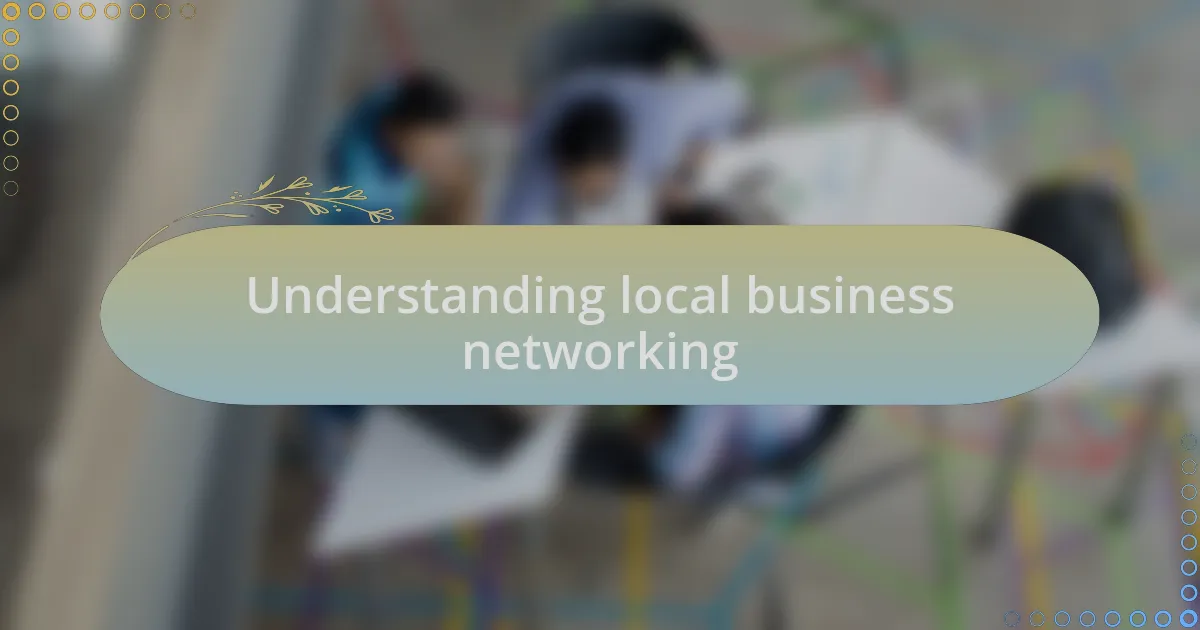
Understanding local business networking
Local business networking is about forging genuine connections within your community. I remember my first networking event; the moment I shook hands with a fellow entrepreneur, I felt a shift in my perspective. Suddenly, I wasn’t just a business owner, but a part of a larger tapestry of local talent and seen opportunities.
The richness of these interactions often surprises newcomers. Have you ever considered how a casual chat can turn into a collaboration that drives your business forward? I’ve seen it firsthand—what started as a simple coffee meetup led to a partnership that significantly boosted our visibility in the community. It’s fascinating how these relationships can blossom when nurtured with authenticity and trust.
Understanding local business networking goes beyond exchanging business cards. It’s about recognizing the symbiotic relationships that can grow from shared interests and challenges. I vividly recall attending a workshop where each attendee shared their struggles. It was eye-opening to realize that we weren’t alone; exchanging stories turned those once-unknown faces into allies. Isn’t it reassuring to know that support and camaraderie are just a conversation away?
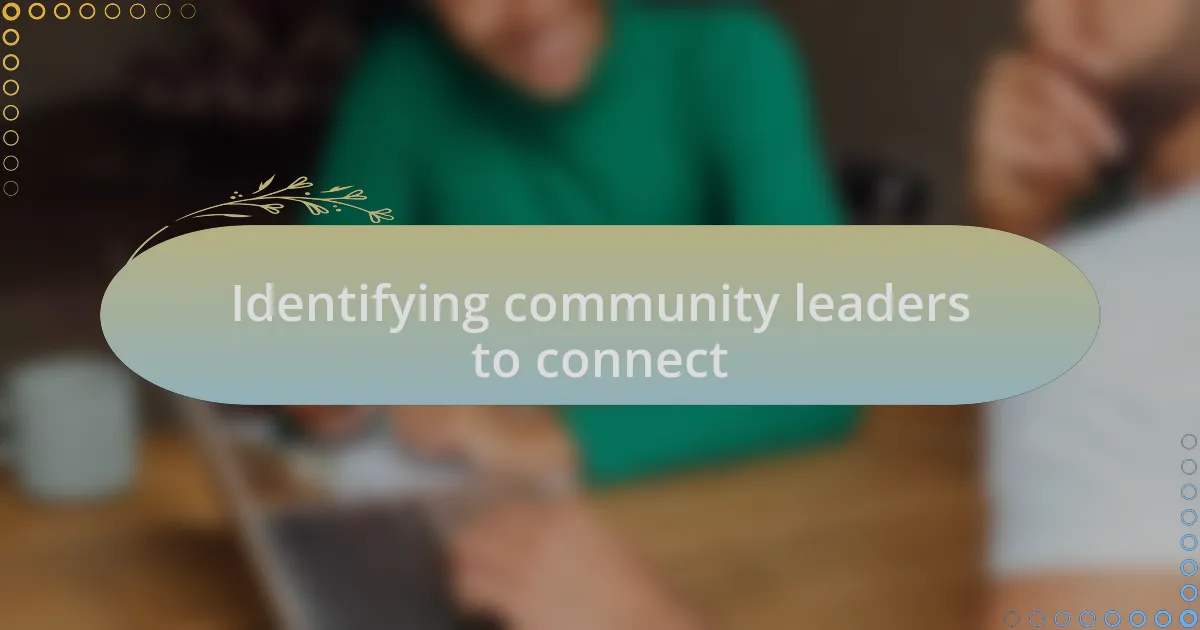
Identifying community leaders to connect
Identifying community leaders begins with observation. In my early networking days, I would attend local events and quietly gauge who seemed to draw others in. At one such meet-up, I noticed a woman passionately discussing local initiatives, and people naturally gravitated toward her. It was a clear indicator of her influence, and I made it a priority to connect with her, discovering later that her insights could open doors I didn’t even know existed.
I often think about the importance of authenticity in these connections. When I approached potential community leaders, I sought those whose values aligned with mine. One afternoon, I attended a charity event and found myself speaking with a former mayor. Our shared interest in sustainable business practices sparked a lively discussion. This personal connection became pivotal in my understanding of local networking—it’s not just about authority but shared visions and goals.
Sometimes, recognizing community leaders requires stepping outside your comfort zone. I remember attending a town hall meeting where I felt a bit out of place, but I quickly realized the attendees were passionate advocates for various causes. By actively engaging with them, I discovered their networks were vast, and many were willing to help others succeed. Isn’t it incredible how stepping into unfamiliar spaces can lead to moments of inspiration and valuable connections?
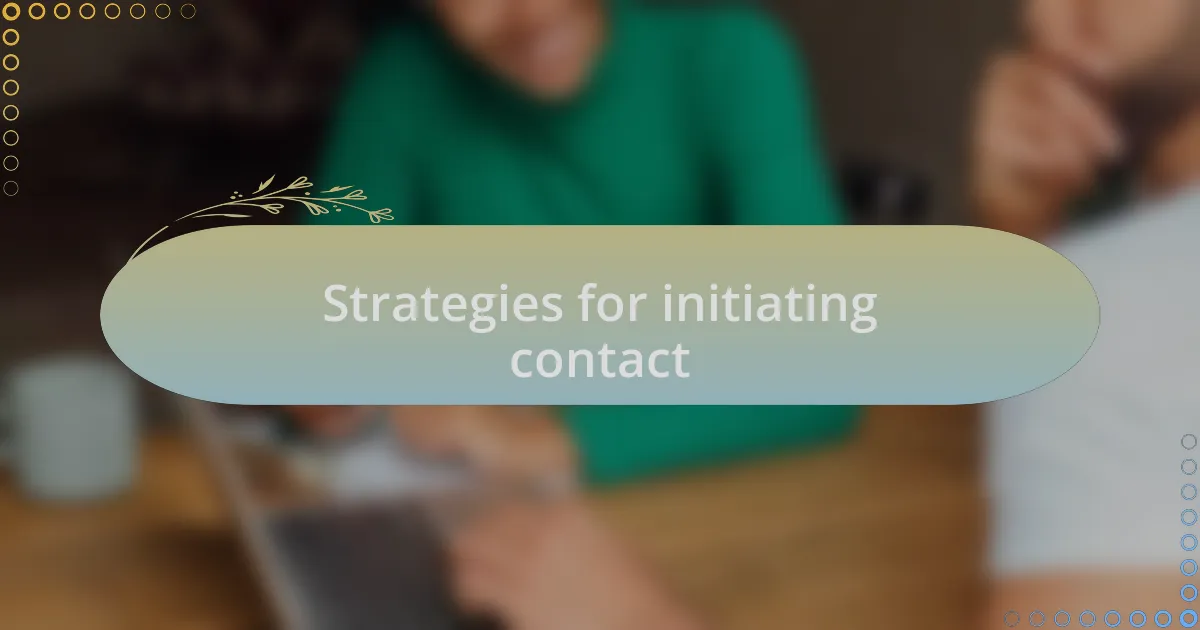
Strategies for initiating contact
To initiate contact with community leaders, one effective strategy is to leverage mutual connections. I recall a time when a colleague introduced me to a local business owner who was well-respected in our area. That introduction was the key that unlocked a dialogue; instead of feeling like a stranger, I was able to start the conversation with a shared reference. How often do we overlook the power of our existing relationships to pave the way for new opportunities?
Another approach I found successful is attending workshops or seminars where community leaders are likely to speak. I attended a panel discussion on small business innovation, and during a break, I approached one of the speakers. By expressing my appreciation for their insights, I found common ground and sparked a meaningful conversation. It’s interesting how passion can create an instant connection, don’t you think?
Don’t underestimate the power of social media as a contact initiation tool. I remember once reaching out to a local leader through LinkedIn after admiring their project. I crafted a thoughtful message mentioning how their work aligned with my interests in community development. To my surprise, they responded positively, and we eventually met for coffee to discuss potential collaborations. This experience reinforced my belief that being proactive and personal in your outreach can yield significant rewards.
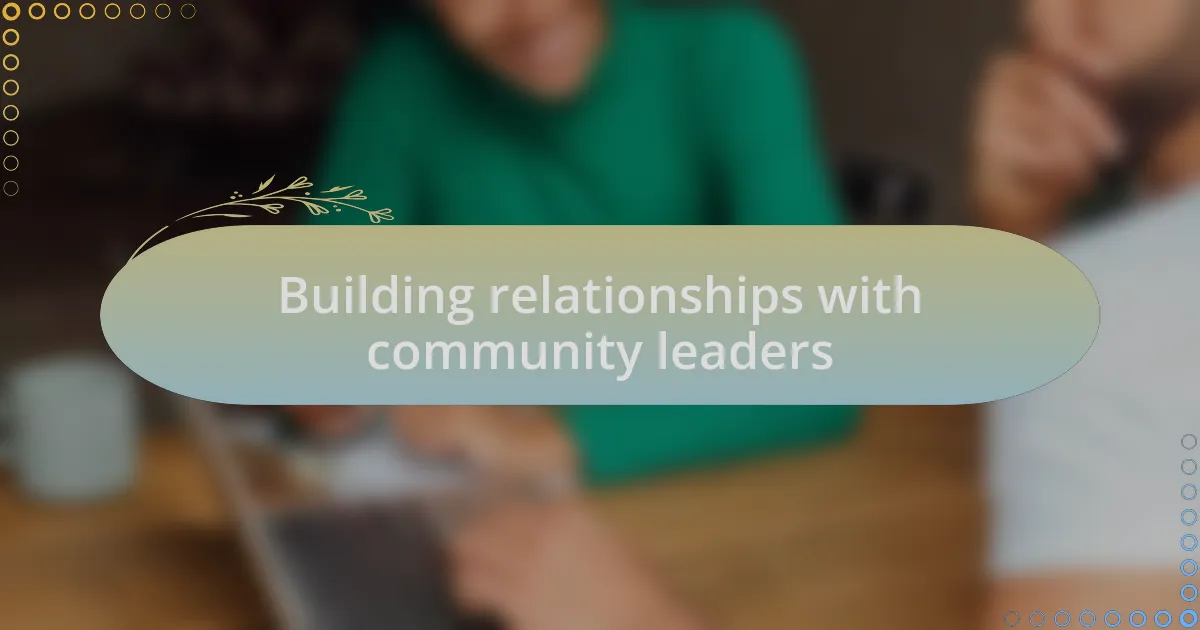
Building relationships with community leaders
Building strong relationships with community leaders is an ongoing journey rather than a one-time event. I vividly remember attending a community fair where I first met a local city council member. Instead of just introducing myself, I took the time to listen to their vision for the neighborhood. This not only gave me insights into their goals but also made it easier to establish a rapport. Have you ever noticed how genuine interest can transform a simple introduction into a meaningful conversation?
Collaboration can be a game-changer in fostering these relationships. I once teamed up with a community leader to organize a charity event. As we worked together, I learned about their leadership style and values, which deepened my respect for them. Throughout the process, I found that shared goals brought us closer together, emphasizing the importance of teamwork in building trust. It’s fascinating how a common cause can knit people together in ways that transcend formal titles and roles.
Reciprocation is key in nurturing these connections. After several meetings with a local nonprofit leader, I realized the value of following up—not just to ask for favors but to offer support and share insights. One day, I shared an article that aligned with their mission, and their gratitude was palpable. This experience underscored that building relationships is about giving as much as receiving. It invites us to think: how can we contribute to others’ success as we seek our own?
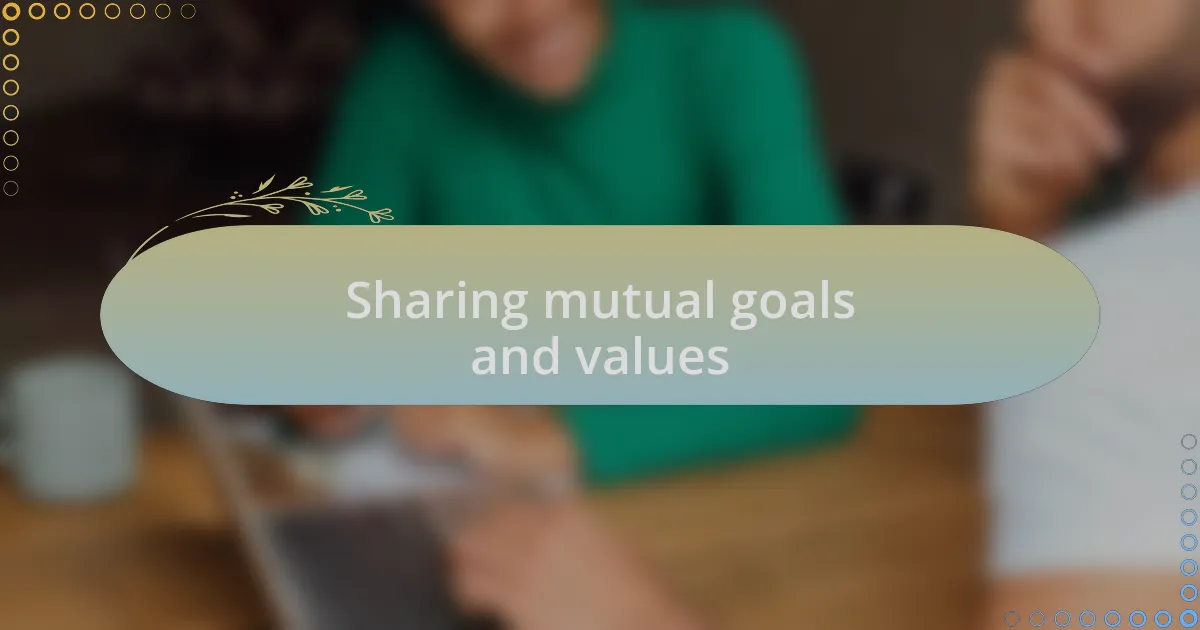
Sharing mutual goals and values
Sharing mutual goals and values can be incredibly powerful in establishing lasting connections with community leaders. I recall a conversation with a local business owner who wanted to promote sustainability in our area. As we discussed our shared vision for a greener neighborhood, I felt an immediate alignment of values that fortified our commitment to collaborate on an environmental initiative. Isn’t it amazing how such shared aspirations create a sense of purpose that transcends individual efforts?
When you identify common goals, it opens the door to deeper conversations. I once joined a roundtable of leaders from different sectors, and what struck me was how easily we found common ground on local youth empowerment programs. The essence of our dialogues shifted from transactional to relational, emphasizing how our distinct experiences could contribute to a collective mission. Have you ever experienced that moment when differences fade away to reveal shared ideals?
This alignment not only fosters trust but also encourages accountability. I remember working with a neighborhood organization where everyone was committed to revitalizing an underdeveloped park. That shared vision inspired each team member to invest their time and energy, creating a sense of ownership over the project. In what ways do our shared goals motivate us to be more involved and dedicated to our community? It’s a reflection of how mutual values can mobilize collective action toward meaningful change.
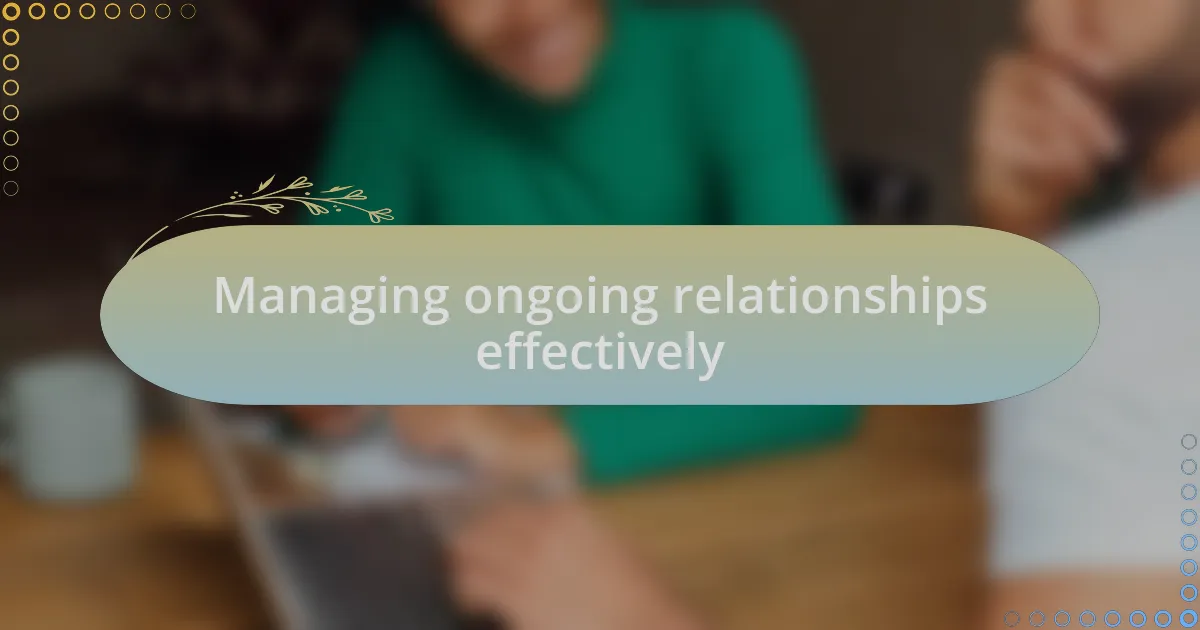
Managing ongoing relationships effectively
Once you’ve established those initial connections, managing ongoing relationships becomes crucial. I remember a time when I partnered with a local nonprofit. Regular check-ins transformed our collaboration from a simple transaction into a dynamic partnership. It’s fascinating how a quick coffee catch-up can clarify expectations and foster loyalty—don’t you think? Those casual efforts solidified our communication.
I’ve learned that being proactive is key in nurturing these relationships. Following up after events or milestones shows that you genuinely care about the partnership. It reminds me of the time I sent a thank-you note to a community leader after a successful fundraiser. Their enthusiastic response was a reminder that small gestures can go a long way in reinforcing connections. Have you thought about the last time you reached out just to say thank you?
Finally, flexibility can be a real asset. Each relationship will ebb and flow based on individual needs and circumstances. I once collaborated with a leader who faced unexpected challenges, and instead of pushing through with our agenda, we adapted our plans. This willingness to accommodate made our bond stronger. How often do we intentionally car about adjusting our approach to support others?